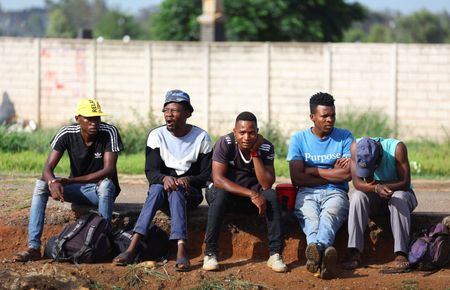By Simon Lewis
WASHINGTON (Reuters) -The Biden administration is overriding human rights conditions on military aid to Egypt, a State Department spokesperson said on Wednesday, granting the U.S. ally its full allocation of $1.3 billion this year for the first time during this administration, despite ongoing concerns over human rights in the country.
The announcement comes as Washington has relied heavily on Cairo – a longstanding U.S. ally – to mediate so far unsuccessful talks between Israel and Hamas on a ceasefire deal to end the war in Gaza.
Of the $1.3 billion in U.S. foreign military financing allocated to Egypt, $320 million is subject to conditions that have meant at least some of that sum has been withheld in recent years.
Secretary of State Antony Blinken told Congress on Wednesday that he would waive a certification requirement on $225 million related to Egypt’s human rights record this year, citing “the U.S. national security interest,” the spokesperson said by email.
“This decision is important to advancing regional peace and Egypt’s specific and ongoing contributions to U.S. national security priorities, particularly to finalize a ceasefire agreement for Gaza, bring the hostages home, surge humanitarian assistance for Palestinians in need, and help bring an enduring end to the Israel-Hamas conflict,” the spokesperson said.
Democrat Chris Murphy, who chairs the Senate Foreign Relations Committee’s Middle East subcommittee, said Washington had previously withheld military aid from Egypt on human rights grounds while maintaining its strategic relationship with the country.
“It’s no secret that Egypt remains a deeply repressive autocratic state, and I see no good reason to ignore that fact by waiving these requirements,” Murphy said.
Cairo has remained a close regional ally of Washington despite accusations of widespread abuses under President Abdel Fattah al-Sisi’s government, including torture and enforced disappearances.
Sisi denies there are political prisoners in Egypt. He says stability and security are paramount and authorities are promoting rights by trying to provide basic needs such as jobs and housing.
The war in Gaza, sparked by the Oct. 7 attacks by Palestinian militants on southern Israel, has increased Washington’s reliance on Cairo for diplomatic efforts like the ceasefire talks. Much-needed humanitarian aid for Palestinians in Gaza also enters from Egypt.
CONTINUED DETENTIONS
Blinken issued a similar waiver on the human rights conditions last year but withheld a portion of the military aid over Egypt’s failure to make “clear and consistent progress” on the release of political prisoners.
This year, he determined that Egypt had made sufficient efforts on political prisoners to release $95 million tied to progress on the issue, the spokesperson said.
They cited Egypt’s efforts to draft legislation to reform pretrial detention and the broader penal code, its release of some political prisoners and a move to end travel bans and asset freezes associated with foreign funding for nongovernmental organizations.
Rights groups have questioned how effective the draft legislation on pretrial detention would be for ending abusive practices and say some human rights lawyers remain under travel bans.
Seth Binder, director of advocacy for the Washington-based Middle East Democracy Center, said that while about 970 prisoners had been released since last September, at least 2,278 Egyptians were arbitrarily arrested over the same period, according to data collected by the center and Egyptian human rights groups.
“There’s no reasonable assessment where one could say there’s been progress on the human rights situation in Egypt. It remains a huge crisis,” Binder said, pointing to the tens of thousands of political prisoners still held in the country.
The State Department spokesperson said Washington was continuing “a rigorous dialogue with the Egyptian government on the importance of concrete human rights improvements that are crucial to sustaining the strongest possible U.S.-Egypt partnership.”
(Reporting by Simon Lewis; additional reporting by Patricia Zengerle; Editing by Nick Zieminski and Jonathan Oatis)










